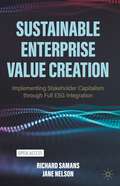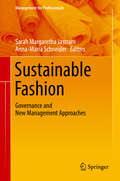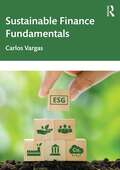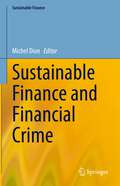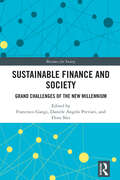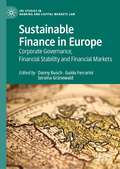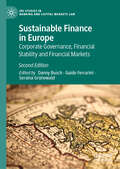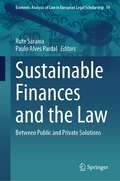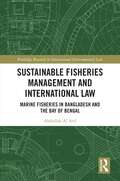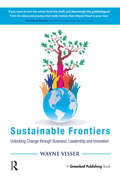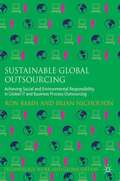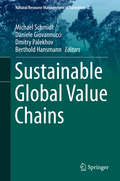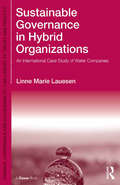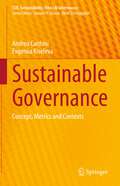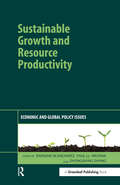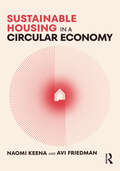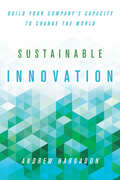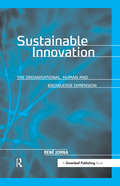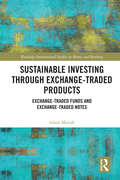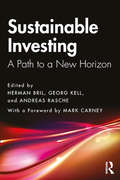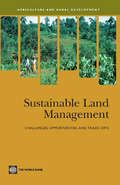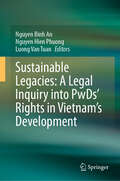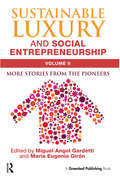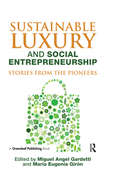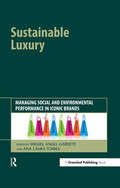- Table View
- List View
Sustainable Enterprise Value Creation: Implementing Stakeholder Capitalism through Full ESG Integration
by Jane Nelson Richard SamansThis Open Access book provides a practical guide to the creation of sustainable enterprise value and implementation of the principles of stakeholder capitalism for corporate boards and management teams. The authors argue that business leadership is on the threshold of a new era driven by major shifts in technology, society, political economy and climate change. They set this transition in international and historical context and outline a comprehensive leadership agenda for fully integrating environmental, social, governance (ESG) and data stewardship risks and opportunities into corporate governance, strategy, reporting and partnerships. This systematic approach is illustrated with good practices by leading companies and includes an explanation of how sustainability reporting is making the leap into formal accounting standards set by the same body that oversees international financial accounting standards and what companies should do to prepare. The book’s combination of scholarly analysis and practical guidance make it a valuable resource for anyone seeking to navigate the new business context, whether from the perspective of a board director, C-suite executive, manager, policymaker, scholar or student.This is an open access book.
Sustainable Fashion: Governance And New Management Approaches (Management For Professionals)
by Anna-Maria Schneider Sarah Margaretha JastramThis edited volume comprises ideas, visions, strategies, and dreams of entrepreneurs, managers, scientists and political experts who share their best practice experience relating to the joint goal of a more sustainable, humanistic, and responsible fashion industry. Readers will find a variety of approaches and strategies that in sum represent a rich pool of insights and cases for anyone interested in the study of new management perspectives and in the systematic advancement of sustainable fashion.In 14 chapters, international authors discuss topics such as Sustainable Business Models, Cradle-to-Cradle, Circular Economy, Human Rights, Ethical Supply Chain Management, Sustainable Fashion Consumption, Certification and Auditing, Traceability, Impact Measurement, and Industry Transformation. Business case studies include H&M, Filippa K, Melawear, Otto, Tauko, and Tchibo. Further brands that are discussed in the book are Prada, Burberry, Hermès, Hugo Boss, and many more. The book demonstrates that sustainable fashion can hardly be realized by just one actor or by using just one business tool or governance instrument. The sustainable transformation of the textile sector requires concerted action of businesses, governments, NGOs, and consumers to clearly demonstrate a coalition for change and a willingness and power to end inhumane and unsustainable business practices in the 21st century. The sum of innovative approaches and solutions presented in this book shows that the momentum for change is strong and that mutual learning, respect and collaboration can lead to interesting and effective new paths of co-creation and shared responsibility in the fashion industry.
Sustainable Finance Fundamentals
by Carlos VargasSustainable Finance Fundamentals provides an accessible overview of this critical, rapidly growing area at the intersection of finance and sustainability. The first part showcases different approaches to sustainable finance, covering banking, impact investing, integrated reporting and strategy, and risk management. The second part covers investing, including equity, green bonds, and crowdfunding. In the final part, issues beyond sustainable finance, such as alternative investments, renewable energy, and innovation, are explored. In addition, two optional appendices provide useful introductions to the time value of money (TVM) and financial statements. Ethical and regulatory issues are addressed holistically throughout the book and sustainable finance is linked to related topics, such as environmental economics and the UN Sustainable Development Goals. Each chapter has an international focus and features examples, "in a nutshell" summaries, and discussion questions. Whether you are a student or professional, Sustainable Finance Fundamentals is essential reading for anyone looking to gain a comprehensive understanding of sustainable finance, impact investing, and related areas. Lecture slides and teaching notes are also available for instructors, making this book an ideal text for courses on sustainable finance.
Sustainable Finance and Financial Crime (Sustainable Finance)
by Michel DionSustainable finance is a holistic approach to the sustainability development goals (SDG), so that the interdependence between environmental, social, and governance issues is unveiled. Sustainable finance takes into account the various challenges following from social change and sustainability, the evolution of capital markets, and the development of efficient risk management practices. Governance issues are an integral part of sustainable finance. However, academic literature has generally neglected to consider strategies to prevent and fight financial crimes as a crucial component of sustainable finance. The aim of this book is to focus on the interconnectedness between sustainable finance and preventing/fighting financial crime, not only as a crucial governance issue, but also as a deep challenge for social and even environmental issues. There is no really sustainable finance without developing strong and efficient means to fight financial crimes.
Sustainable Finance and Society: Grand Challenges of the New Millennium (Business for Society)
by Francesco Gangi Daniele Angelo Previati Flora SfezSustainable Finance and Society explores how finance can be managed to address pressing global challenges.Part of the Routledge Business and Society series, this book investigates the evolving financial ecosystem shaped by new stakeholder capitalism. It examines how finance can be leveraged to benefit society while balancing environmental, social, and financial performance. Through a combination of theoretical insights and empirical studies, the book offers a comprehensive framework for understanding sustainable finance as a driver of societal well-being. This book provides a thorough analysis of sustainable finance, from the roles of financial markets and institutions to the rise of socially responsible investments. Key topics include sustainable investing evaluation, green finance, entrepreneurship, innovation, and the role of women in finance leadership. The book features a deep dive into the challenges and opportunities of managing finance for societal benefit, offering valuable insights for aligning financial practices with ethical, environmental, and social goals.It is essential reading for academics, researchers, and policymakers interested in finance for society. It is also relevant for finance practitioners, sustainability experts, and institutional investors looking to implement socially responsible financial practices and address the grand challenges of the 21st century.
Sustainable Finance in Europe: Corporate Governance, Financial Stability and Financial Markets (EBI Studies in Banking and Capital Markets Law)
by Guido Ferrarini Danny Busch Seraina GrünewaldThe aim of this edited volume is to bring together the views of expert academics and practitioners on the latest regulatory developments in sustainable finance in Europe. The volume includes a wide range of cutting-edge issues, which relate to three main themes along which the volume is structured: (1) corporate governance; (2) financial stability; and (3) financial markets. With individual contributions deploying different methods of analysis, including theoretical contributions on the status quo of macro-financial research as well as law and economics approaches, the collection encourages interdisciplinary readership and will appeal to those researching capital markets law, European financial law, and sustainable finance, as well as practitioners within the finance industry.
Sustainable Finance in Europe: Corporate Governance, Financial Stability and Financial Markets (EBI Studies in Banking and Capital Markets Law)
by Guido Ferrarini Danny Busch Seraina GrünewaldThis second edition brings together the views of expert academics and practitioners on the latest regulatory developments in sustainable finance in Europe and includes 5 new chapters on sustainable remuneration, reporting, lending, green monetary policy and ESG. The volume includes a wide range of cutting-edge issues, which relate to three main themes along which the volume is structured: (1) corporate governance; (2) monetary policy and financial stability ; and (3) financial markets. With individual contributions deploying different methods of analysis, including theoretical contributions on the status quo of macro-financial research as well as law and economics approaches, the collection encourages interdisciplinary readership and will appeal to those researching capital markets law, European financial law, and sustainable finance, as well as practitioners within the finance industry.
Sustainable Finances and the Law: Between Public and Private Solutions (Economic Analysis of Law in European Legal Scholarship #16)
by Rute Saraiva Paulo Alves PardalSustainable (public and private) finance is closely interlinked with the Sustainable Development Goals (SDGs). The latter focus on enhancing the protection of both social and environmental assets at the local and global level, from the real economy and everyday life to financial markets and public policies, thereby laying the groundwork for a transition. Global sustainability challenges – including climate change, natural resource depletion, and rising inequality – are affecting the commercial environment and real economy in a way that presents both risks and opportunities for the private and public financial sectors. On the one hand, policymakers and investors (including banks and pensions funds) are increasingly recognizing the environment’s implications for the financial sector through both physical and transitional risks, producing impacts on financial services and products, not to mention corporate governance. On the other hand, governments and European and international institutions are aware of their sustainability-related responsibilities and the consequences of their actions. Both regulate and supervise financial markets but also use their budgetary and tax policies (e.g. carbon tax) and their participation in financial markets (e.g. green bonds and development banks) to overcome sustainability challenges. Therefore, the objective of this book is to help readers understand how private and public financial systems can be modified to create better value for society through sustainable approaches and initiatives such as the integration of environmental, social, and governance (ESG) factors in investment, procurement, and budgeting.
Sustainable Fisheries Management and International Law: Marine Fisheries in Bangladesh and the Bay of Bengal (Routledge Research in International Environmental Law)
by Abdullah-Al ArifThis book presents a comprehensive analysis of the legal and policy frameworks for marine fisheries management and examines the efficiency of the institutions responsible for the formulation, implementation and enforcement of marine fisheries laws and policies in Bangladesh. Sustainable management of marine fisheries is a complex, multi-dimensional and multi-stakeholder process that entails sustainable use of marine living resources and conservation of marine biodiversity. Offering a critical analysis to these frameworks that play a crucial role in the conservation and management of fish stocks in areas within and beyond national jurisdiction, this book examines inadequacies and implementation gaps in the legislative, policy and institutional frameworks that contribute to the unsustainable exploitation of marine fish stocks in Bangladesh. It recommends law and policy reform for conservation and sustainable management of marine fisheries in Bangladesh and the Bay of Bengal.
Sustainable Frontiers: Unlocking Change through Business, Leadership and Innovation (Business Frontiers Ser.)
by Wayne VisserSustainable Frontiers throws down the gauntlet to business to step up and be the catalyst for a sustainable future. It presents eight keys to unlocking transformational change – through leadership, enterprise, innovation, transparency, engagement, responsibility, integration and future-fitness. Far from being another tame review of corporate social responsibility and sustainable business initiatives, the book dispels the myths of sustainability and challenges us to let go of old systems that are failing to deliver economic, social and environmental transformation. Sustainable Frontiers gets to the heart of why the sustainability and CSR movements have failed in the past and offers a new view of how sustainable business practices can shape-shift to make a genuine difference inside and outside organisations. The book gathers together experiences from across the globe and shows to the reader what can be achieved with the right vision and leadership. Expect to be challenged, engaged and inspired to join the revolution on the sustainable frontier.Making a successful transition to a more sustainable future depends on letting go. Sustainable Frontiers shows how we must find ways to let go of an industrial system that has served us well, but is no longer fit for purpose. How we will need to let go of old styles of leadership and out-dated models of business, high-impact lifestyles and selfish values. How we must learn to let go of cherished ideologies that are causing destruction and beliefs about ways to tackle problems that are failing to resolve crises.If we are to reach sustainable frontiers, it must begin with changing our collective minds - and only then will we change our collective behaviour. How we accomplish such a global mind-shift is the subject of Sustainable Frontiers. And it starts by admitting that those of us at the vanguard of the sustainability revolution also have to change. We will also have to let go of cherished beliefs and strategies that are not working - starting with the way we communicate our vital, life-saving mission.
Sustainable Global Outsourcing
by Brian Nicholson Ron BabinThrough a series of case studies and surveys, the authors examine current sustainability trends in outsourcing and recommend how providers should prepare for increasing buyer demands in this area, suggesting buyers and providers can work together to build successful outsourcing relationships through collaborative sustainability projects.
Sustainable Global Value Chains (Natural Resource Management in Transition #2)
by Robert AtkinsonValue chains are a vital part of how our world operates, yet we are only beginning to understand how to make them sustainable. This volume addresses the crux of that challenge by presenting a broad array of options for understanding and managing the complexity of sustainability initiatives that affect, and are also influenced by value chains. Its chapters present diverse perspectives on both political and private sector governance, including governmental regulations and private standards, and embrace the emergent and critical value of innovative approaches to monitoring and evaluating progress. Finally, the volume offers a review of concrete examples for transformation and transition towards more sustainable value chains in selected sectors, including, amongst others, agriculture, forestry, mining, and tourism.
Sustainable Governance in Hybrid Organizations: An International Case Study of Water Companies (Finance, Governance and Sustainability)
by Linne Marie LauesenIn Sustainable Governance in Hybrid Organizations the author Linne Marie Lauesen explores how businesses that have succeeded in conducting sustainable governance, manage and govern their sustainable performance: in other words, how they manage to be economically, socially, and environmentally sustainable. In this respect, hybrid organizations that are formed as businesses with a mission to be sustainable and to provide services for society - such as water companies - are a good point of departure. Water companies are highly regulated whilst working primarily for the betterment of society and on behalf of generations to come, for whom clean and plentiful water and the preservation of nature is a must. Linne Marie has dug deep into these types of hybrid organizations in order to reveal which mechanisms of organizational governance for sustainability are at play, and how these organizations manage to balance their triple bottom lines in order to survive financially, socially, and environmentally and make a business out of their conduct. Balancing these three bottom lines in a sustainable way is explained in a clear and accessible way and the juxtaposition between non-profit and for-profit water companies will show how this model can be transferred to other business spheres.
Sustainable Governance: Concept, Metrics and Contexts (CSR, Sustainability, Ethics & Governance)
by Andrea Cardoni Evgeniia KiselevaThe role of governance as a fundamental pillar of sustainability is widely recognized and confirmed by its inclusion in the main ESG issues (environmental social governance). Through the complex role of governance in the context of ESG, research has developed the notion of sustainable corporate governance, i.e., a system based on the integration of shareholder and stakeholder objectives that protects the environment and the broader community. This book provides a sound theoretical definition, a precise measurement system, and best practice examples for the implementation of sustainable corporate governance. It includes theoretical foundations based on stakeholder and institutional theories from different environments and contexts, such as developed and developing economies, large publicly traded companies and SMEs, and family businesses. In addition to explaining the concept theoretically, it uses practical case studies to address the effective integration of sustainable governance into corporate structures. The book provides business students and researchers with an in-depth analysis of the emerging concept of sustainable governance and is valuable for academics as well as corporate and financial market participants.
Sustainable Growth and Resource Productivity: Economic and Global Policy Issues
by Paul J.J. Welfens Zhongxiang Zhang Raimund BleischwitzWritten by international experts in their respective fields, Sustainable Growth and Resource Productivity provides a comprehensive overview of global issues of raw materials supply and resource use. It also introduces new views and perspectives on the sustainable growth of emerging economies and develops a rationale for a new resource economics. This book emphasises why resources are back on the agenda: firstly, because of their fundamental economic role in technological progress and long-term prosperity; secondly, because deficits in raw material markets are now intertwined with deficits in the financial markets; and, thirdly, because the sustainable management of natural resources is a crucial element in responses to new global challenges such as climate change. Sustainable Growth and Resource Productivity analyses raw materials supply and resource use in a global context. The contributions present state-of-the-art results and perspectives on the availability of resources and discuss factors such as limited supply, demand from emerging and other economies and the critical shortage of some materials – particularly some metals – that are essential inputs in many high-tech processes and may put certain industries at risk. Sustainable Growth and Resource Productivity sheds new light on the economics of sustainable growth. Linking the current financial crisis with stock market pricing and innovation dynamics, it argues for reforms in international macro-economic policies. It also critically discusses the implications of valuing labour productivity over capital and resource productivity and argues that policies favouring capital productivity will increase both social and economic sustainability. Further contributions are made on the business dimensions of material efficiency as well as on policy recommendations. The book examines the overall empirical trend towards decoupling resource use from economic growth. It undertakes a rigorous cross-country comparison and looks in more detail at the cases of Finland and Greece, as well as at emerging economies and their role in the global governance of natural resources. A key focus is placed on China, with discussion of recent findings regarding Chinese domestic policy on energy, climate and resources as well as on developing Chinese foreign policy in Africa. The book concludes with the positing of a new theory of resource economics: an emerging sub-discipline that puts resources at its heart but clearly aligns with other fields of economics, and transcends the borderlines of geology, geography, material science, recycling and waste, as well as elements of other social sciences. This important new book will be essential reading for economic researchers, governmental officials, businesses and NGOs with an interest in understanding the policy links to sustainable growth and in learning more about the emerging field of resource productivity.
Sustainable Housing in a Circular Economy
by Avi Friedman Naomi KeenaThis book relates circular economy principles to housing design and construction and highlights how those principles can result in both monetary savings, positive environmental impact, and socio-ecological change.Chapters focus on three key circular economy principles and apply them to architectural construction and design, namely rethinking of the end-of-use phase of a building and the potential of design-for-disassembly; the role of digitization and data standardization in fostering evidence-based circular economy design decision-making; and presenting space as a resource to conserve, via exploration of the sharing economy and flexibility principles. Beyond waste management and material cycles, this book provides a holistic understanding of the opportunities across the building life cycle that can allow for sustainable and affordable circular housing. With case studies from 13 different countries, including but not limited to the Hammarby Sjöstad district in Sweden, the Circle House in Denmark, Benny Farm in Canada, VMD Prefabricated House in Mexico, and the Deep Performance Dwelling in China, authors pair theoretical frameworks with real-world examples.This will be a useful resource for upper-level students and academics of architecture, construction, and planning, especially those studying and researching housing design, building technology, green project management, and environmental design.
Sustainable Innovation: Build Your Company's Capacity to Change the World
by Andrew HargadonIf we can carry in our pockets more computing power than the Apollo program needed to put a man on the moon, why can't we solve problems like climate change, famine, or poverty? The answer lies, in part, in the distinctive challenges of creating innovations that address today's pressing environmental and social problems. In this groundbreaking book, Andrew Hargadon shows why sustainable innovation--the development of financially viable products that support a healthy environment and communities--is so difficult when compared to creating the next internet ventures or mobile apps that disregard these criteria. While other books treat innovation across sectors equally, Hargadon argues that most effective innovation strategies hinge on attention to the context in which they are pursued. Instead of relying on a stale set of "best practices," executives must craft their own strategies based on the particulars of their industries and markets. But, there are some rules of the road that foster a triple bottom line; this book provides a research-based framework that outlines the critical capabilities necessary to drive sustainable innovation: a long-term commitment, nexus work, science and policy expertise, recombinant innovation, and robust design. Sustainable Innovation draws on a wide range of historical and contemporary examples to show business readers and their companies how to stand on the shoulders of successful pioneers.
Sustainable Innovation: The Organisational, Human and Knowledge Dimension
by René JornaHOW SUSTAINABLE IS INNOVATION? Problematically, most contemporary patterns of innovation in human social systems and organisations are not sustainable. This prevents people from learning effectively, from recognising and solving their problems, and from operating in sustainable ways. It is arguably why societies, businesses and industries around the world are so unsustainable. Sustainable innovation is a pattern of social learning and problem-solving that is, itself, sustainable. The sustainability of innovation, moreover, is linked to the sustainability of its outcomes, which manifest themselves in what people produce and do in the world. Sustainable innovation, then, is a necessary precondition for sustainability in how societies and organisations function – the ways they organise, the products and services they make, the energy and resources they use, and the wastes they produce. As challenges such as demographic pressures, ethnic tensions, terrorism, global poverty, pandemics and abrupt climate change force their way into mainstream politics and business, so we see growing interest in innovation, entrepreneurial solutions and, critically, issues such as how to ensure successful solutions replicate and scale. Sustainable Innovation aims to illustrate that shift. Instead of simply focusing on environmental and technological matters, it views and evaluates innovation-for-sustainability in terms of the human, social and management challenges and responses. It argues that a just, efficient and sustainable balancing of these elements is best achieved by the development of new knowledge, and by the evolution of better means both of embedding that emerging knowledge in organisations and institutions, and of managing the relevant flows of information, knowledge and wisdom. The book stresses that claims that a particular product, production process or service are sustainable usually assume that an appropriate balance has been achieved between people, planet and profit. However, calculating the sustainability of such things, let alone of complex systems such as enterprises or economies, can be impossible. Instead of "sustainability", the book favours the use of terms such as "making sustainable", emphasising that in dynamic operating environments organisational processes are changing constantly, whether or not they are under effective strategic control by management. Innovation, too, is dynamic by definition. Sustainable Innovation argues that there must be a constant focus on the triple bottom line of economic, social and environmental value creation during the innovation process. Sustainable innovation is a new challenge for organisations. It is a process that should permeate the whole organisation, in terms of its members, its tasks, its coordination mechanisms and its procedures. Waste or pollution should not be seen as the reason for further intervention downstream, but as an end-of-the-pipe effect, which could be organisationally cured upstream. Developed from the Dutch research programme "Knowledge Creation for Sustainable Innovation", this book presents empirical research and cases to develop a theory of sustainable innovation that is based on management of knowledge, knowledge and cognition and innovation approaches. Sustainable Innovation suggests that knowledge and innovation will be the key drivers of social and corporate sustainability in the years ahead. It will be essential reading for managers and researchers in areas such as sustainability, innovation, knowledge management and organisational learning.
Sustainable Investing Through Exchange-Traded Products: Exchange-Traded Funds and Exchange-Traded Notes (Routledge International Studies in Money and Banking)
by Adam MarszkDespite the rapid and substantial increase in the popularity of exchange-traded products (ETPs), particularly exchange-traded funds (ETFs), some categories remain underexplored in the academic and professional literature. One of the most notable examples is exchange-traded notes (ETNs). This book offers a detailed yet highly focused insight into the ETN market.The book presents the key attributes and mechanisms of ETNs, such as their number, providers, assets, listing locations, benchmarks, charges, and objectives, and their links with other parts of the financial system. It examines the empirical data connected to all ETNs that are available globally, showing their features at the individual product and country levels. The book merges the topic of ETNs with the ubiquitous trend in the contemporary investing industry – the increased focus on sustainability and environmental, social, and governance (ESG) issues. It addresses the sustainability compliance of ETNs and their possible utilization in ESG investing, highlighting selected examples as case studies. Their strengths and weaknesses are underscored in this context by comparing them with other solutions and the legal frameworks in the countries in which they are listed.The book will interest the academic community and a broad range of practitioners, such as retail and institutional investors or asset managers.
Sustainable Investing: A Path to a New Horizon
by Herman BrilThis book tells the story of how the convergence between corporate sustainability and sustainable investing is now becoming a major force driving systemic market changes. The idea and practice of corporate sustainability is no longer a niche movement. Investors are increasingly paying attention to sustainability factors in their analysis and decision-making, thus reinforcing market transformation. In this book, high-level practitioners and academic thought leaders, including contributions from John Ruggie, Fiona Reynolds, Johan Rockström, and Paul Polman, explain the forces behind these developments. The contributors highlight (a) that systemic market change is influenced by various contextual factors that impact how sustainable investing is perceived and practiced; (b) that the integration of ESG factors in investment decisions is impacting markets on a large scale and hence changes practices of major market players (e.g. pension funds); and (c) that technology and the increasing datafication of sustainability act as further accelerators of such change. The book goes beyond standard economic theory approaches to sustainable investing and emphasizes that capitalism founded on more real-world (complex) economics and cooperation can strengthen ESG integration. Aimed at both investment professionals and academics, this book gives the reader access to more practitioner-relevant information and it also discusses implementation issues. The reader will gain insights into how "mainstream" financial actors relate to sustainable investing.
Sustainable Land Management: Challenges, Opportunities, and Trade-offs
by World BankLand is the integrating component of all livelihoods depending on farm, forest, rangeland, or water (rivers, lakes, coastal marine) habitats. Due to varying political, social, and economic factors, the heavy use of natural resources to supply a rapidly growing global population and economy has resulted in the unintended mismanagement and degradation of land and ecosystems. 'Sustainable Land Management' provides strategic focus to the implementation of sustainable land management (SLM) components of the World Bank's development strategies. SLM is a knowledge-based procedure that integrates land, water, biodiversity, and environmental management to meet rising food and fiber demands while sustaining livelihoods and the environment. This book, aimed at policy makers, project managers, and development organization, articulates priorities for investment in SLM and natural resource management and identifies the policy, institutional, and incentive reform options that will accelerate the adoption of SLM productivity improvements and pro-poor growth.
Sustainable Legacies: A Legal Inquiry into PwDs’ Rights in Vietnam’s Development
by Nguyen Binh An Nguyen Hien Phuong Luong Van TuanThis book offers a comprehensive exploration of Vietnam's legal landscape through the lens of inclusivity. Covering topics ranging from educational rights and workplace inclusivity to corporate social responsibility and transport accessibility, this book provides a nuanced understanding of the challenges and opportunities facing PwDs in Vietnam. What sets this book apart is its interdisciplinary approach, weaving together legal analysis, policy evaluation and real-world case studies to provide practical insights for policymakers, legal practitioners, academics, and advocates. With a focus on actionable recommendations, it is a valuable resource for anyone interested in promoting sustainable development and social justice for persons with disabilities. Accessible yet rigorous, the book is aimed at a wide audience, from legal practitioners and policymakers to disability rights activists and academics. It serves as both a roadmap for legal reform and a catalyst for promoting a more inclusive and just society
Sustainable Luxury and Social Entrepreneurship Volume II: More Stories from the Pioneers
by Miguel Angel Gardetti María Eugenia GirónLuxury products are now seen by a growing number of global consumers as an important and more widely available way of expressing personal aspirations and values. Most consumers of luxury products and services use them as status symbols and symbols of success. However, the definition of success – and the way it is perceived by others – is changing. Many of these successful consumers now want the brands they use to reflect their concerns and aspirations. Such products come with a heavy social and environmental cost. Sustainable luxury is about rediscovering the old meaning of luxury – a considered purchase of a beautifully crafted object with built-in social and environmental value.The social entrepreneurs documented in this book highlight the relationship between personal values and sustainability, entrepreneurship and innovation in developing and marketing luxury products. The pioneers outline how they have developed inclusive supply chains with poor and vulnerable communities. Their stories prove that luxury need not be a destructive force. Instead, this book opens a window on a world where entrepreneurial pioneers can change the rules of the game.
Sustainable Luxury and Social Entrepreneurship: Stories from the Pioneers
by Miguel Angel Gardetti María Eugenia GirónLuxury products are now seen by a growing number of global consumers as an important and more widely available way of expressing personal aspirations and values. Most consumers of luxury products and services use them as status symbols and symbols of success. However, the definition of success – and the way it is perceived by others – is changing. Many of these successful consumers now want the brands they use to reflect their concerns and aspirations. Such products come with a heavy social and environmental cost. Sustainable luxury is about rediscovering the old meaning of luxury – a considered purchase of a beautifully crafted object with built-in social and environmental value.The social entrepreneurs documented in this book highlight the relationship between personal values and sustainability, entrepreneurship and innovation in developing and marketing luxury products. The pioneers outline how they have developed inclusive supply chains with poor and vulnerable communities. Their stories prove that luxury need not be a destructive force. Instead, this book opens a window on a world where entrepreneurial pioneers can change the rules of the game.
Sustainable Luxury: Managing Social and Environmental Performance in Iconic Brands
by Miguel Angel Gardetti Ana Laura TorresMost consumers of luxury products and services use them as status symbols – symbols of success. However, the definition of success – and the way it is perceived by others – is changing. Increasingly, consumers want the brands they use to address growing concerns that luxury products invariably come at a heavy social and environmental cost. The luxury industry faces its biggest challenge yet in satisfying an emerging demand of successful consumerism – products that meet high environmental, social and ethical standards.This collection sees internationally renowned fashion, luxury and sustainability experts come together to explore the challenges faced - and solutions developed - by luxury goods companies in sourcing, producing and marketing luxury products. Sustainable Luxury: Managing Social and Environmental Performance in Iconic Brands represents the most comprehensive collection of current writing on the nascent relationship between sustainability and luxury. It will be essential reading for academics researching sustainable development in the fashion and luxury industries and it will provide invaluable guidance for practitioners seeking the latest research to help them meet consumer demand for sustainable goods and services.
